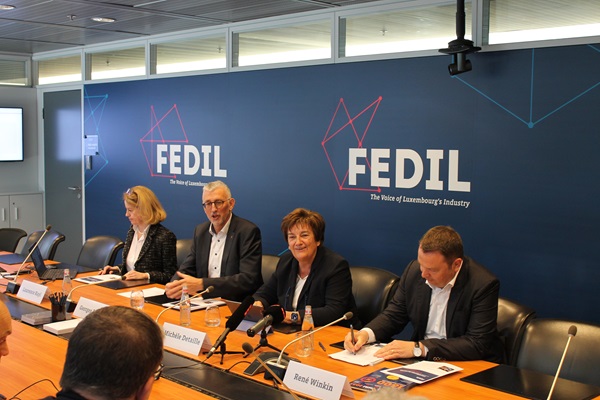 Credit: ©FEDIL
Credit: ©FEDIL
On Tuesday 23 April 2024, the Assembly of FEDIL – The Voice of Luxembourg's Industry presented its activity report and the results of the accounts for 2023.
The 2024 Annual General Meeting also marked the appointment of Georges Rassel as the new President of FEDIL, succeeding Michèle Detaille.
On a global scale, the year 2023 was again marked by geopolitical instabilities which affected international trade. In Luxembourg, the year under review was placed under the sign of the double electoral meeting and the arrival of a new government, all against a backdrop of persistent inflation and economic slowdown.
After reaching a record level in 2022, the cost of energy continued to have a significant impact on business activity and competitiveness. Throughout the year, FEDIL noted that its experts worked to support businesses, particularly to prepare the response to possible supply disruptions and take advantage of the opportunities of the reform of the European electricity energy market or to adapt state aid to the needs of businesses.
Furthermore, FEDIL added that evolutions in the job market, by the vote of new laws relating to disconnection, moral harassment, the hiring of non-EU employees and the protection of whistleblowers, also issues concerning the shortage of qualified labour and a certain number of social conflicts, kept the FEDIL team in suspense. FEDIL aims to listens to the concerns of companies to provide them with advice and assistance.
In the field of innovation and digitalisation too, the year 2023 was marked by important directives negotiated and voted on at the European level. Data Act, Cyber Resilience Act, NIS 2.0 and the Artificial Intelligence Act were among the subjects that FEDIL experts covered in depth, informing companies of their respective application consequences.
Finally, the detailed analysis of the Coalition Agreement, presented in November 2023, and meetings with the new ministers allowed FEDIL to reaffirm its positioning on economic, environmental or digital issues that affect the industry and its companies.
As the strengthening of Luxembourg’s industrial fabric has a European scope, the deadline for the European elections in June 2024 is a crucial moment for the future of the continent, FEDIL stressed. In this sense, from the start of the year, FEDIL has increased its messages to national and European decision-makers who are responsible for shaping future EU policy. Revitalising the European industry while achieving ecological, energy and technological transformation, strengthening and harmonising the single market, encouraging innovation and digitalisation with a view to better competitiveness, favouring international trade, and above all lightening the regulatory shackles and bureaucratic complexity are the challenges that require a pragmatic policy approach and rapid actions.
The new President's work programme
FEDIL added that the European agenda is also among the priorities of the work programme of the new presidency of Georges Rassel. During the next European five-year term, it will be "essential" to put in place an industrial policy more favourable to investment and to put an end to the culture of distrust among some towards businesses, by simplifying the regulatory framework. These are prerequisites for realising FEDIL's vision, which is that of the development and diversification of a strong, decarbonised and highly productive economy, driven by the exploitation of new opportunities or market niches, technological progress, development and talent attraction and international collaboration.
At the national level, FEDIL emphasised that a clear and coherent strategy is necessary for the development of the manufacturing and technological industry, coupled with a policy in favour of investment which takes into account infrastructure (development and provision of land), the tax aspect (tax incentive measures), the financial aspect (aid and risk capital) and the authorisation procedures. This new strategy also aims to position the country optimally in the energy transition and on the path to decarbonisation.
When it comes to innovation, the subject of artificial intelligence (AI) is among the concerns of almost all companies. FEDIL reported. The preparation of the country for inherent technological changes, the adequacy of the legislative framework and the identification of specific areas of application will be the three main axes around which the work of FEDIL aims to revolve, which also intends to intensify its exchanges with the research players in Luxembourg. Generally speaking, the objective must be to perfect a framework favourable to the intensification and acceleration of research and development activities and public-private partnerships in the field of innovation.
To successfully carry out this development of the industry and move forward on innovation projects, FEDIL stressed it is essential to strengthen the capacity to attract and retain talent. Ensuring a work organisation anchored in a flexible framework for both the employee and the employer, improving the mobility of workers, developing and adapting professional training, connecting the academic world and businesses and promoting technical and scientific professions among young people are all levers for attracting and retaining the necessary qualified workforce, according to FEDIL.
FEDIL noted it wishes to involve its members even more and promote their skills and know-how to jointly develop proposals for the industrial future of the country; constructive proposals that it will continue to convey to political authorities.
Renewal within the Board of Directors
Roland Bastian, Frédéric de Radiguès, Michèle Detaille, Yves Elsen, Robert Glaesener, Romain Hoffmann, Ferdinand Kayser and Thierry Wolter are reportedly leaving the FEDIL Board of Directors.
Furthermore, the General Assembly elected to the Board of Directors Antoine Clasen (CEO, Caves Bernard-Massard), Philippe Glaesener (Senior Vice President, SES Space & Defense), Christophe Goossens (CEO, RTL Luxembourg), Paul Konsbruck ( CEO, LuxConnect), Georges Krombach (Chief Commercial Officer, Landewyck Tobacco), Isabelle Lentz (CEO, Munhowen) and Henri Reding (Country Head Luxembourg, ArcelorMittal Europe Long Products).









